Episode #47: Uncovering the Mystery Behind Analytic vs Gestalt Language Processors
Meet Lenora Edwards, Chief Knowledge Officer for Better Speech - a revolutionary online speech therapy company dedicated to helping children use language effectively! Lenora has years of experience when it comes to analyzing the differences between analytic language processors and gestalt language processors. In this interview, she reveals her expertise on the matter, as well as a fascinating look into echolalia - or "echo speech." Tune in to find out more about Lenora's journey in providing quality speech therapy options for children and to get an insider's perspective on these different types of language processors. During our Season 2 episodes, we’ll be asking each guest to share “2 Truths and a Lie” about themselves as a fun way to get to know our guests. We’ve decided not to give the answer right away so our listeners can try to guess the true answers. In the comments section for this video, add your thoughts to which of Lenora’s answers were true and which was the lie. Here are the answers she gave us: 1. She had a baking business. 2. She hiked the Appalachian trail. 3. She hiked the Tour du Mont Blanc. *** We’ll post the answer on our Instagram and Twitter account a week after this video posts so go there and check to see if you got it right! https://twitter.com/waterprairie https://www.instagram.com/water.prairie/ Lenora’s Contact information: Website: https://www.betterspeech.com/ Facebook: https://www.facebook.com/yourbetterspeech/ TikTok: https://www.tiktok.com/@better.speech Instagram: https://www.instagram.com/betterspeech/ Linked In: https://www.linkedin.com/company/better-speech/mycompany/ YouTube: https://www.youtube.com/c/BetterSpeechVideo Connect with Us: https://linktr.ee/waterprairie Support this channel: https://www.buymeacoffee.com/waterprairie Music Used: “LazyDay” by Audionautix is licensed under a Creative Commons Attribution 4.0 license. https://creativecommons.org/licenses/by/4.0/ Artist: http://audionautix.com/
The Water Prairie Chronicles Podcast airs new episodes every Friday at Noon EST!
Find the full directory at waterprairie.com/listen.
A Peek Into the World of Online Speech Therapy with Lenora Edwards
Show Notes:
Meet Lenora Edwards, Chief Knowledge Officer for Better Speech – a revolutionary online speech therapy company dedicated to helping children use language effectively! Lenora has years of experience when it comes to analyzing the differences between analytic language processors and gestalt language processors. In this interview, she reveals her expertise on the matter, as well as a fascinating look into echolalia – or “echo speech.” Tune in to find out more about Lenora’s journey in providing quality speech therapy options for children and to get an insider’s perspective on these different types of language processors.
During our Season 2 episodes, we’ll be asking each guest to share “2 Truths and a Lie” about themselves as a fun way to get to know our guests. We’ve decided not to give the answer right away so our listeners can try to guess the true answers. In the comments section for this video, add your thoughts to which of Lenora’s answers were true and which was the lie. Here are the answers she gave us during the interview:
- She had a baking business.
- She hiked the Appalachian trail.
- She hiked the Tour du Mont Blanc.
*** We’ll post the answer on our Instagram and Twitter account a week after this video posts so go there and check to see if you got it right!
https://www.instagram.com/water.prairie/
https://www.twitter.com/waterprairie
Lenora’s Contact information:
- Website: https://www.betterspeech.com/
- Facebook: https://www.facebook.com/yourbetterspeech/
- TikTok: https://www.tiktok.com/@better.speech
- Instagram: https://www.instagram.com/betterspeech/
- Linked In: https://www.linkedin.com/company/better-speech/mycompany/
- YouTube: https://www.youtube.com/c/BetterSpeechVideo
Connect with Us: https://linktr.ee/waterprairie
Support this channel: https://www.buymeacoffee.com/waterprairie
Music Used: “LazyDay” by Audionautix is licensed under a Creative Commons Attribution 4.0 license. https://creativecommons.org/licenses/by/4.0/ Artist: http://audionautix.com/
Episode #47: Analytic vs Gestalt Language Processing with Lenora Edwards
A Peek Into the World of Online Speech Therapy
(Recorded December 28, 2022)
Recently I had the chance to speak with Lenora Edwards. Lenora has years of experience as a speech and language pathologist, and in this interview, she reveals her expertise on the matter as well as a fascinating look into analytic and gestalt language processors.
Welcome back to the Water Prairie Chronicles everyone. We appreciate you being with us today, and we have a special guest. I am talking today with Lenora Edwards. She’s the Chief Knowledge Officer with Better Speech, an online speech therapy company, and we’re gonna tell you a little bit more about that, but Lenora is an ASHA board-certified speech-language pathologist.
That’s a lot to say in one phrase. Since 2010, she’s been working with individuals of all ages, starting with our youngest learners, and that’s where we’re gonna focus a little bit today. And Lenora, welcome to the Water Prairie Chronicles.
It is so great to spend time here with you today. Tonya, thank you so much for having me. I really appreciate it.
All right, so I gave you a general introduction, but can you tell us a little bit more about yourself?
Absolutely. So like you said, my name is Lenora Edwards and I am a board-certified speech-language pathologist and A S H A, it’s the American Speech Language Hearing Association.
And with that indicates, is. As a board-certified clinician, I have had the proper education and I have passed my boards, and therefore I’m certified by the board within the United States. That being said, I then have the ability to be licensed in states. So really, I am licensed in the state of Pennsylvania, and I live in Pennsylvania, but I’m also licensed in four other states.
Because I have the ability to work online, I can apply for licensure in those other states. So that allows us to provide speech therapy services, especially online throughout the US because I can be on my computer, but I have clients in Colorado and clients in South Carolina. So it’s really fantastic that we have the ability and the technology to do that.
Today we’re gonna be talking about the speech development is such a large. Range of topics, um, that I’ve asked Lenora to talk with me a little bit about just speech development today. Thinking of our younger, I wouldn’t say patients, but our younger learners really because they all have to start learning at some point to communicate.
So I’ve asked if we can touch on some of the differences in how people process language, and so we’re gonna get into that in just a minute. But to change things up a little bit, for season two, we’ve decided that we’re gonna start by playing a game instead of waiting till the end. So season one, if you’ve listened through that, we did a speed round.
This is season two now. So we’re going to do a game called “Two Truths and a Lie.” So if you’ve ever done an icebreaker in a large group, you may have done this before, but what we’re asking each guest to do is to share two truths about themselves and then one lie. And we want those that are listening to try to discern which is the lie.
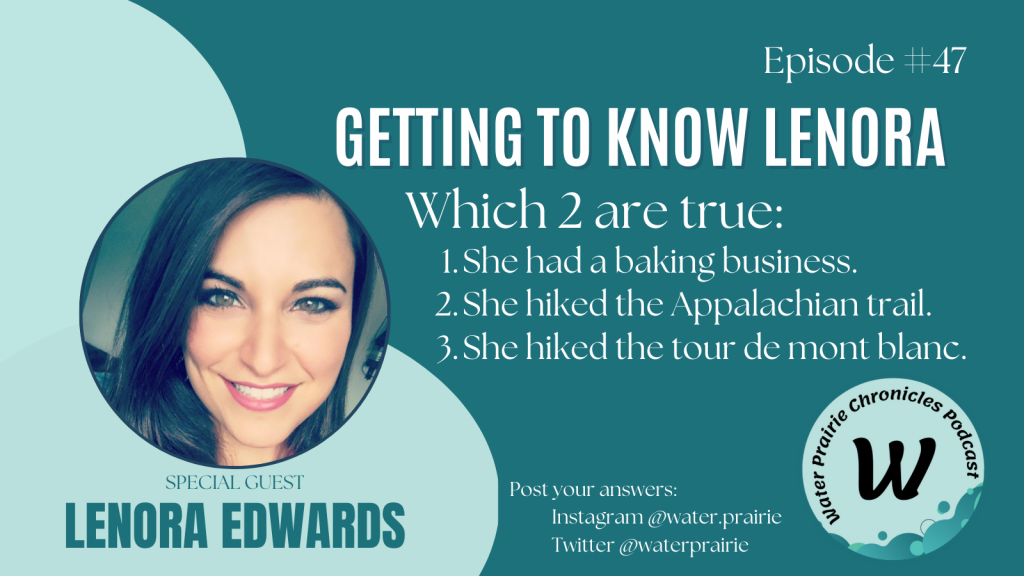
And those that are listening, you can put a comment if you’re watching the YouTube channel, you can make a comment below the YouTube video or you can go to our Instagram @water.prairie and we’ll post the 3 choices there so you can choose which one, and we will eventually release the answer.
We wanna give you a little bit of time to talk about it first. So Lenora, what are your two truths and a lie? And mix them up so we don’t know which one is which.
Okay. My two truths and a lie. Uh, one, I had a baking business. Two, I hiked the Appalachian Trail, and three, I hiked the Tour du Mont Blanc. So there are two truths and a lie.
Hmm. Okay. We will be posting those on YouTube and on Instagram. So I wanna see some conversation. Those that are listening, go and find it. And if you wanna see if you’re right or not, check back again later to see what our answer is. And remind me to ask what the answer is before we finish this, because I may forget that part.
To start out with, I’ve seen some terms about analytic language processors, and gestalt language processors. Echolalia, I think is how you say it. Can we start with just what is an analytic language processor and what’s maybe an example of what that would look like?
Absolutely. So I’m gonna rewind before I get to that.
When it comes to language development, and you know, a lot of the time people will tell me like, “oh, we’re expecting,” and I’m like, great. Start talking. Because language starts developing immediately and it does develop in the womb. So it’s really important that as that little baby is growing throughout that timeframe to keep talking because they are picking up information.
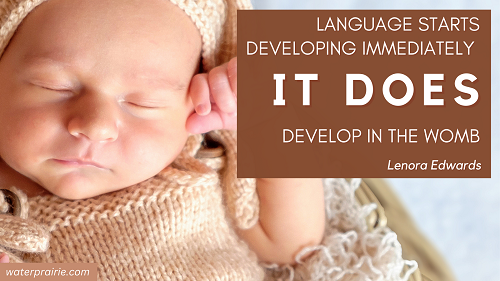
Once that blessed day arrives and they’re finally here in your arms to keep talking. We are actually born with the ability to understand language. That being said, there has to be language input for us to make cohesive sense of it. So our brain, we are equipped for that language, part of the brain to understand language.
But like I said, language has to come in. Now when it comes to language, and as a speech-language pathologist, people often think, oh, we only work with articulation. “Oh, there’s nothing wrong with my speech. I speak fine.” And that is true, but there’s much more that we do. So when it comes to language development, there are two parts.
There’s our ability to understand language. So everything that you and your listeners are doing right now, that is the receptive part of language, you’re understanding the information that I’m saying. Then it comes to expressive language. Everything that I’m doing and how I’m stringing my sentences together in the grammatical formation I’m choosing is the expressive component of language.
So that does develop and it really starts developing as early as the womb. So it’s important, the understanding of language, it’s important for them to have language going on in their environment. And we often say, you know, to new parents, “talk, narrate, tell them what you’re doing,” whether you wanna call it sportscasting or narrating or just talking, whatever label you wanna give it.
As your little one is developing, they’re listening. So the more that you talk to them, the more vocabulary and the more information you are giving them. So when you pick them up out of the crib and when you lay them down to change their diaper, keep talking about what you’re doing and say what you’re doing and why you’re doing it. And to keep singing and to keep engaging with them socially because that social attention, that joint attention, that interaction is so important for our communication, and these are foundational things for our communication development.
When it comes to very specific, you asked about analytical and gestalt language processing. Also Echolalia. So when it comes to analytical language, they used to think back in the day that we only developed language in this one way and it was just one word at a time and it would build upon itself. We’ve now after I think some 40 years ago, researchers came up with also, we’re actually understanding it in two ways.
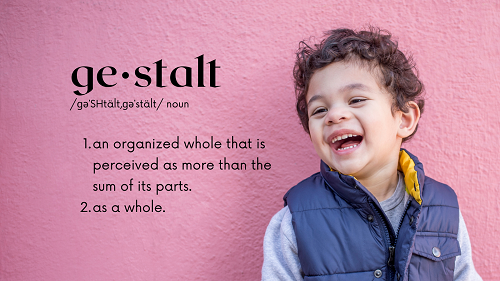
We have the analytical development. Or the Gestalt language processing, in which case Gestalt means “as a whole.” So some children develop language in their understanding of language in scripts, in chunks of information. So, such as, “let’s go to the store.” If they heard it on a TV show or if they heard somebody say it, they’ll repeat it. They’ll echo that entire phrase.
For the analytical, they’ll come out with “go,” and then it’ll be, “let’s go,” and then it’ll be “to,” “let’s go to.” And as you can see, it went from one word at “go.” “Let’s go” to two words, and “let’s go to” at three words. So that continues to build that building up from 1, 2, 3 is the analytical language development.
When it comes to gestalt, you’re getting that chunk of information and the reverse basically happens. So children will come up with this script or this phrase that they’ve caught and are repeating. Then they have to chunk downwards. They have to mix and match and understand these combinations to create intentional communication.
So there is definitely a difference when it comes to that. When it comes to echolalia, they’re repeating and there is a very normal development that your child should be repeating because children learn through experience. They learn through you modeling. So as you are saying things, they’re working to model you.

They’re working to echo you. That’s a good thing. When it starts to get beyond two years, and it’s still quite persistent, that is an indicator that you would wanna reach out to a speech-language pathologist and really have your child assessed to see what else is going on for their language development and how else they may be able to be cared for if there are services that may need to be provided.
So thinking back to when my children were young. They would’ve been analytic language processors because they started with one word, maybe two. And it would be like, you would hear them say, you know, “go,” they would get first, but then they would maybe, you know, “go home.” “Go play.”
They’d add the action or the destination to it. And then it would add some other descriptive words with that. So that’s the analytic part of it. And then recently I ran into a young adult who was communicating with me, but as she was talking, I was hearing phrases that I’d heard from a baking show that I’d watched.
Another one from an animated movie that I’d seen all in the same sentence. The phrases were in there. so that would be an older person who is still using the Gestalt, is that right? Or would that be the echo?
It would still be echolalic because they’re repeating something, but also they’re producing a phrase and it’s important to remember that when children or adults when they are doing this, this is them communicating. This is a great thing and it should be acknowledged and validated. You know, years ago, especially, we really didn’t have a lot of information on how to properly treat this. And thankfully, with advancements in our own education and our own skillset and development of the world, we now have great tools to really help children and other people to take this skill, but to also harness it in a way that’s effective. So we’re not saying “No, be quiet. Don’t say that.” We’re saying, “oh, okay. I understand you want something.” And then also what we’re doing is offering additional vocabulary to support it, cause sometimes they’re wanting, clearly they’ve now said a phrase, they’ve now said a, a script.
They are wanting to communicate and it’s up to us as the listeners to validate it, but to also indicate that we’re understanding you and to really work to have that back and forth of understanding information. So that’s really important that we then also offer alternative scripts rather than saying, “no, no, don’t say that.”
Or you know, let’s say, “good job Johnny. Good job Johnny. Good job Johnny. Good job Johnny.” We can say “good job, Johnny,” and then what we’ll also indicate to recommend to families and you know, people who are interacting with these other individuals is talk in the third person. “I did a good job.” So that way they’re using functional language. Now they’re not talking in the third person from what you said, and to really go back and forth of, “no, you say this,” “I say this,” “you say this.”

That can be very confusing. So when we offer that third-person model, “I did a good job.” Then they’re using it appropriately. We’ve given them more tools. ‘”I did a good job.” We’re now indicating we’re showing visually what we’re expressing. “I did a good job. I did that on paper.” And that person is able to then understand, but also to have effective and intentional communication.
So in a younger child who is starting in that role, about what age would you see those longer phrases like, “I did a good job?” Would that be around age three or four? That they’re repeating as long of a phrase as that?
And when they’re developing in that gestalt component, at that whole piece of information or that script, we’re hearing more words.
Sometimes it might just be, “wow.” Which is one word, but it’s a statement. It’s clear. And other times it might be, “let’s go to the store.” “Let’s go to the store.” And they may be looking at something, but also saying a phrase that they’ve heard multiple times. So now we’re trying to offer new vocabulary. When you do that, if they’re pointing to something, let’s say, um, “Super fast red car,” “super fast red car,” and they’re seeing a red car, but they want to play with the toy. We’ll take that pattern that they’re using, we’ll take that variation of their voice and how they’re saying it. We’ll match it, but we’ll also then pair the new language in there. So, ” super fast red car.” “super fast red car.” “I want the red car,” “I want the super fast red car.” And that way you’re offering functional language “I want,” and you’re also matching it. So that way then they’re echoing, they’re gonna hear what you’re saying. And they’re gonna be able to produce it more effectively and more functionally.
So are they learning not just what the words are related to the object or whatever it is, but also the voice inflection so all of it comes together for them as a package?
It does, but when it’s a gestalt, they understand it chunked up, and then we have to chunk it down for them to get more specific.
So when they understand they may be using it appropriately. In that case, I gave a pretty close example. They may be using it appropriately, but they’re on their own intonation. They’re on their own rhythm and sound of what they’re hearing. It’s up to us to match that, to come in with new information, and then we can play with it once we have that connection of understanding. So that way, rather than saying, “no, slow down, say this,” it’s not as harsh, but it’s also really supportive and what they actually understand is “oh, this person understands me because they’re speaking in the same rhythm that I am. They’re using the same voice flexion,” and it’s much more of a match, and then we can go on together.
So when I first started looking at this, I equated it to learning a foreign language for me. Um, in one case, when I was in high school, I learned Latin and then French, so we started with the basic words and then we build onto that.
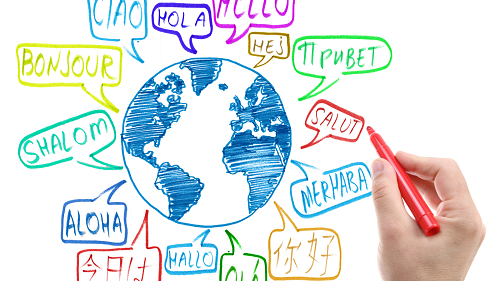
So that would be that analytic language path. But then I was traveling for a while with an international company and I would be landed in a country where I didn’t know the language, and so I’m picking it up from hearing phrases and watching and learning, and the phrases began to make meaning, but the phrases were phrases because I couldn’t separate the words from them yet.
And so I would say that would probably be more the Gestalt type, even though that may not be my natural learning process. It was the only way I could learn that language.
Yeah. That, and you’re also getting submerged in it, especially because when you have foundational communication tools to begin with.
So your brain is working to piece this together, and not only are we hearing phrases, but now we’re hearing it in a context. So when we’re traveling or when we’re learning a second language, and you’re seeing somebody order ice cream, you are following that pattern of, “okay, this is what this means.”
This is how this shapes, you know, if you use some more generic terms and you don’t have a context, “oh, that’s good.” Well in what way? What are we talking about, “good?” You know, can we define it a little bit more? It’s a lot harder when you go and you travel and you learn another language.
You’re getting so submerged in that environment, which is a great thing because your neurons start to fire and wire in a more effective way, and you’re really coming in cohesively. You’ve now taken your physical body to a new place and it’s working to align with other people, and you’re watching this other language and then you’re picking up things that you did not even know that you were aware of.
But because you’re so immersed in it, your mirror neurons, all your neurons are just firing to really make cohesive sense of that environment.
So I wasn’t sure if that was a good comparison or not. It was just the best I could do to try to connect with it.
Good comparison. I like it.
Well cause then I was thinking, if I can think of it that way, then, when I’m talking to a four-year-old who’s at this stage maybe I can understand a little bit more because they’re coming into our world now. And, and they don’t have the benefit of being an adult with a full language vocabulary, even in another language but they still have a lot inside that they want to say and communicate. We’re trying to find ways to do it.
Absolutely, especially when little ones come in, I often tell people they have no idea what’s going on. They don’t know a wall, they don’t know a pen, they don’t know a ball.

It’s up to us to explain this entire world to them, and little ones, they are so, so smart, especially because their brain is really developing at a phenomenal rate, and it’s working so hard to make sense of this world and to make sense of language and to really, you know, um, piece things together so, so much.
It’s extraordinary how brains develop, especially in those first 5, 6, and 7 years. Absolutely astounding.
So is there an age that if a child is not being helped to learn to communicate, so if they’re not an analytic learner and they’re kind of being overlooked for a while, is there an age where it’s hard to go back and regroup and to continue?
Or can they always be picked up and caught up again?
I would say depends on the child, depending on where they are and what’s going on. That being said, if there is a concern that their language is not developing, it’s not that we can’t go back and it’s not that they can’t develop. The first and foremost is to have them assessed by a professional to determine where they are on the formal scales that we use, using our formal assessments, but also what else?
Using our informal assessments. How are they interacting with peers? How are they interacting in the home? You know? Let’s say you have a three-and-a-half-year-old and they’re now in daycare. Okay. Well, and the provider is having some concerns that they’re not interacting quite as much and they’re expressing that to the parent as the parent is saying.
“Oh, okay. I’m not too sure.” One of the great things about Better Speech is that you can come to our website, betterspeech.com, and we offer a free 15-minute consultation. So when that parent has questions and they’re not sure, I don’t know about you, but I roll over at 2:00 AM, and I got questions. I don’t have six months to wait to speak to a professional.
I have questions now. So as early as the next business, we’re able to connect with people and answer their questions. So say you’re three and a half year old, something’s going on. They’re repeating a lot. They’re, you know that they’re talking, but it’s not making a whole lot of sense. And now the teachers and caregivers are starting to really express concerns.
You can reach out to us at Better Speech, and also the really important thing is that you’re then able to provide speech therapy services to that child. It’s not a, “ah, well you missed the window. Sorry, kiddo.” It is an absolute yes. Speech therapy services will be beneficial to you. And it’s really important because we want that little one to be able to understand their environment.
Do you want apple juice or orange juice to drink? And do you wanna have pancakes or waffles? We want them to be able to make those decisions and to express what they wanna express. “I want the ball.” That’s really important to be able to tell people your wants and your needs, and it’s very imperative that we have those services for those children.
Whether they get provided by the school system or early intervention or through Better Speech, the most important thing is to be able to provide services to that little one.
I was hoping you would answer that way because in my mind it is never too late. You always have a chance to make someone’s life better.
Absolutely. I completely agree. I don’t think I know anybody that would be like, “oh, sorry, you’re too late.”
So you kind of touched on my main questions here, but I did wanna go back to something that I think is important that we discuss. At what age should a parent be expecting to pick up on something if there is a concern? You know, at six months, there’s probably not a concern there, but is it 12 months?
Is it 18 months? We had said three, but you had mentioned two earlier too, so kind of clear that up for us.

So when language starts, especially for little ones, as I said, they’re listening all the time. As their language, even though they don’t have their first words and they’re not talking, they are communicating.
Children communicate through their coos and their babbles and their laughs and their giggles and their cries. That is intentional communication. This is why you’ll often hear parents say, “oh, that’s not that cry, that’s this cry.” Because the child has now said, this is my cry for this and this is my cry for this.
And we as the caregivers and the parents of that child, understand that. They wanted us to know that, and now we understand it. We have it now. When they’re working to communicate, what you’ll often see is little ones will start to, as they were cooing, they’re now gonna start babbling.
We’ll often hear “ba, ba, ba, ba,” or when they’re laying in the crib or (buzzing sound with lips) they’re playing. That is a play. When they’re just drumming their lips. But when they start to use consonants and when they start to string vowels, “ah, ah, ah, e, e e,” that is their babbling play and they’re learning and they’re working to understand and to make sense of all this information that they’ve been hearing for so long.
And as your little one, typically by the first birthday will hear. One word. Those are general guidelines and there’s a lot of flexibility in those guidelines, but they’re still guidelines. So at one year old, you’re gonna start to hear one-word vocabulary. So as you get to two years, you’re gonna start to hear two-word combination vocabulary.
Three years, you’ll start to hear three-word vocabulary combinations. It might start out as “muh” for more, then you might hear, “more please,” that attempt to communicate. And then you’ll start to hear, “I want more.” That’s a progression. That’s an analytical development that we were talking about earlier.
That is very, very appropriate. So those are the guidelines for sure. If you’re not hearing your child babble, “bah, bah, bah, bee, bee, bee, boo boo.” Making those noises. If you’re not hearing your child, babble, in that, you know, 10, 12 months even it’s, or seven, eight months, if you’re not hearing those attempts at combinations, that’s a little interesting. Not necessarily they need to, they need speech therapy. You want to see this communication, this back and forth. So when you, let’s say you have your, um, eight-month-old and you’re sitting and you’re playing with a toy and they’re looking at a book and they’re looking and you wanna see them engaged in that book, and you’ll start to hear, “uh, uh,” as they’re attempting.
There are approximations, there are attempts to communicate, and that’s a really, really good thing. If you have a dog in the house and let’s call the dog Bo. If you’re not hearing “Bo Bo” an attempt at one-year-old, that’s a little concerning, but again, not massively. When it’s two years and you’re not hearing those things, those are concerning.
So we usually say that 18 to 24 months is that, if you’re not hearing, really start defining those words or “mom” or “baba,” those combinations. Those are definitely concerns, and if you ever have concerns, especially those 2:00 AM question marks, reach out to professionals and even if it’s for your own peace of mind, I’m very strong proponent of if you have a question, Absolutely speak with somebody and let that question be known, because that’s a really good thing.
People aren’t supposed to know, certain child language development. They’re not supposed to know these certain milestones if they didn’t have a child before. They’re now developing these skills. They’re developing this awareness, so if you don’t know, that’s okay. Ask. That’s why we’re here, and it’s so important to ask questions and to not feel stupid, a lot of the time they’ll warn me and they’ll say, I have a stupid question. I’m like, it’s not a stupid question. You wouldn’t know the answer. Why would you know? This is why we we’re having this interaction. This is a good thing. It’s not a stupid question. So I really try to allow people a lot of grace and understanding that it’s okay.
It’s a good thing to have a question by all means.
We’ve mentioned Better Speech a few times through this now, and you’ve talked about the free consultation if they had a question. Tell us a little bit more about exactly what is the company, the website, whatever you can tell us that the parents can benefit from knowing about this.

Absolutely. So Better Speech is an online speech therapy company. We are over 150 speech-language pathologists strong. We also all have at least 10 years’ experience. So for me personally, I’ve worked in the NICU, I’ve worked in the PICU, I’ve worked in inpatient outpatient therapy clinics.
I have experience. It’s not like I’m right out of college, which isn’t a bad thing for those who are right out of college, but some people want to know what other experiences you have. So we each have at least 10 years of experience, but also we are nationwide, so like I said earlier, I am licensed in Pennsylvania, but I’m also licensed in four other states.
And because we are online, we have the ability to provide speech therapy services throughout the entire US and then we are also internationally based. So we are able to provide online speech therapy services to so many people, and that’s a really big deal, especially when you live 45 minutes from a clinic or you have to wait six months to get on a waitlist to get an evaluation.
That’s a huge deal. We are able to match people as early as the next day with a clinician in their state so that they can receive speech therapy services. And that’s so important because especially with little ones and their development, time is of the essence. It’s truly, truly important.
So what is the website?
It is betterspeech.com. And we have all this fantastic social media. So come visit us there, and if anybody has questions, reach out to us at betterspeech.com or leave comments on our YouTube and our Instagram and our TikTok, and we will do our very best to answer any and all of your questions and provide you with as much care and service as we can.
Excellent. So those are listening. I’ll post the links to everything that she sent me. I have like eight different links there that I can put on and I’ll put them on the resource page on the website.
So just check the show notes and you’ll be able to get there for that. Is there anything that I didn’t ask you about that we should talk about?
We have an amazing practice library on our platform.
So what all is on there?
So on our Better Speech platform, when we have clients, we have people often ask, how do you do speech therapy online?
And it’s actually, we’ve been online since long before the pandemic. So we are very comfortable online, and we have this incredible platform where we have games that we help engage our clients with and the massive benefit of making it fun, cause learning happens, especially when it’s fun, is we are also able to then have them, that the family as a client, they’re able to log into their account, they’re able to see their progress and see all their notes, but they’re also able to play games and having your parent or guardian engage with you and play games while you’re having speech therapy and while you’re learning is so, so important because it really helps that child understand that they’re seen and that they’re heard and that they’re cared for and that this is important. Whereas if you go to an outpatient clinic, sometimes what can happen is, the parent and the child are getting separated, or at least in my state, they’re still in masks and shields so there’s other hindrances going on, but also in a school system, the parent isn’t able to be there with Better Speech, because we are online, we provide speech therapy services right in the comfort of your own home. And we get to work with parents and guardians one-on-one along with that child and explain what we’re doing and why we’re doing it.
And it’s so, so massively beneficial. And the gains these children make and gains adults make because we also provide adult speech therapy services is absolutely phenomenal.
Oh, I know what I wanted to ask you. On your website, and those that are listening, go and check out the website. They do have a list of price breakdowns of the types of services.
Does insurance cover any of those? So that’s your cash price?
We do accept insurance, but also what we provide people with is what we refer to as a superbill, which sounds so awesome. I love the name of it, but it’s a form that has your information on it. It also has our notes and it also has the information your insurance company wants.
for when you go and work with your insurance company to ensure that those services are provided. And that’s such a great thing because that way you can turn around and make sure that you are getting the proper coverage that you need from your insurance provider and that the information is there for them.
So they would file themselves?
I was impressed when I saw the prices and so for those that have never done an out-of-pocket type cost like this, you actually will be pleasantly surprised when you see what they have posted, but knowing that insurance also is a possibility may make it an affordable piece for them.
That is our goal, to be not only effective and not only convenient but to be incredibly affordable because it’s so important that people receive the proper care and the proper services at an affordable price.
Lenora, thank you for coming on today and sharing this information with us. I really appreciate you addressing my questions and just giving us the extra information about the company as well.
Thank you so much, Tonya, for letting me be here. It was so nice spending time with you.
Meet Today’s Guest:
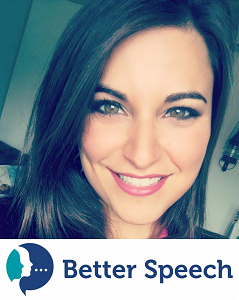
Lenora Edwards is an ASHA Board Certified Speech Language Pathologist and Chief Knowledge Officer with Better Speech. Since obtaining her CCC’s in 2010, she has worked with individuals of all ages from little ones who are learning to understand and express themselves to adults who want to improve their speaking skills and become more fluent and effective communicators. Lenora loves to teach and educate others so if you have questions, please don’t hesitate to ask.
